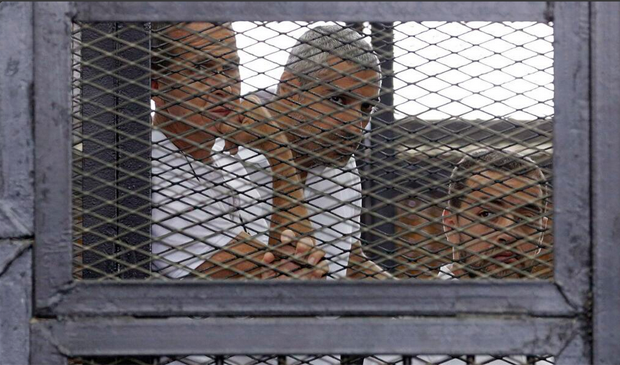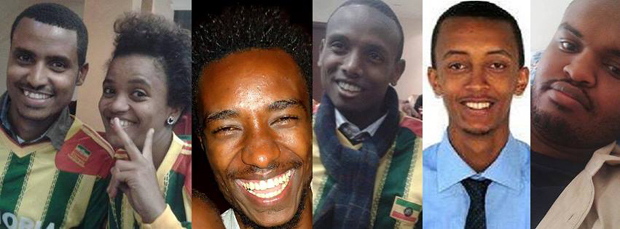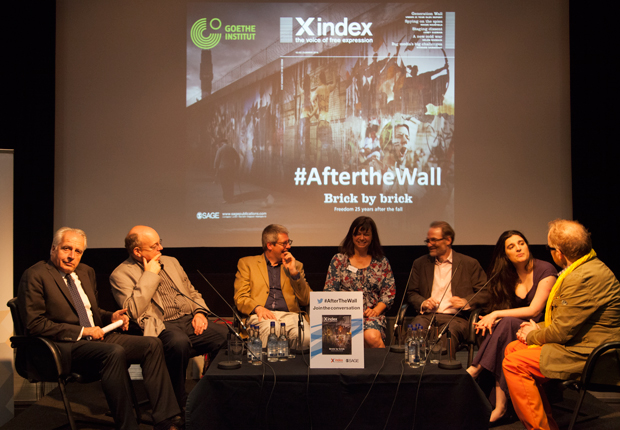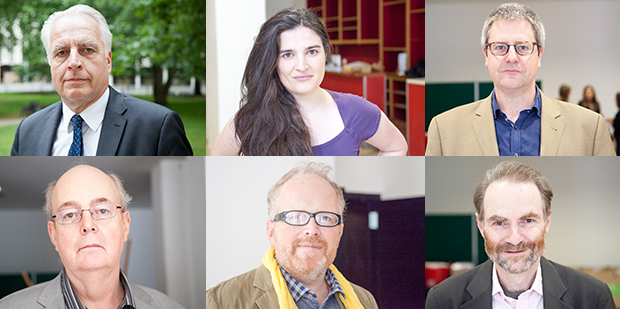14 Jul 2014 | Draw the Line, Young Writers / Artists Programme, Youth Board

Three Al Jazeera journalists were among those sentenced to prison on terrorism charges.
In 1997, British journalist Robert Fisk interviewed Bin Laden. Fisk was not accused of being a terrorist, he was only doing his job. For decades, journalists have been interviewing terrorists, criminals and drug lords, because this is their job; to give a voice to everybody, whether they agree with them or not.
Last month, Egypt sentenced three Al Jazeera journalists to seven years in prison under the country’s anti-terrorism laws; they were accused of spreading false information, as well as supporting the now banned Muslim Brotherhood. In an extremely polarised political climate, giving a voice to the Muslim Brotherhood was deemed inciteful and inflammatory.
Art has been a means of stretching the boundaries, but can art sometimes be a public safety risk?
A series of cartoons, some of which depicted Prophet Mohammed, published by a Danish newspaper in 2005 sparked angry and violent protests across the Arab world. The same happened again when a 13 minute trailer of a movie called Innocence of Muslims appeared on Youtube two years ago. Earlier this year, French comic and political activist Dieudonné M’bala M’bala was banned from performing after his shows were found to incite racial hatred and anti-semitic sentiment by French courts. The comedian was also banned from entering the United Kingdom.
These cases raise a very important question: When does giving a platform to extremist views through art or journalism become an act of terrorism? Should artists or journalists be exempt from terrorism laws or should inflammatory works be banned?
Get involved the discussion using the hashtag #IndexDrawtheLine and tell us — where do you draw the line?
11 Jul 2014 | Africa, News

(Photo: Zone 9/Facebook)
“We blog because we care!” This is the slogan and rallying cry of Zone 9, a group of young Ethiopians writing about social and political issues in their country. For over two months however, blogging has been out of the question for most of them. In late April, six members of the group – which takes its name from an area of Addis Ababa’s notorious Kaliti prison, where several journalists are jailed – were arrested and have been detained since.
Befeqadu Hailu, Abel Wabela, Atnaf Berahane, Natnael Feleke, Mahlet Fantahun, Zelalem Kibret – all between the age of 25 and 32 – have been accused of “working with foreign organisations” and “receiving finance to incite public violence through social media”, but have yet to be formally charged. Journalists Edom Kassaye, Tesfalem Weldeyes and Asemamaw Hailegiorgis were also arrested for their alleged links to Zone 9. Tomorrow, several of them are due in court again.
The story of the case so far, as covered by the blog Justice Matters, makes for worrying reading. The group were initially taken to Maekelawi detention centre, where according to Human Rights Watch, political prisoners have been tortured. They have been prevented from communicating with lawyers and family members. Hearings have predominantly served to extend the police’s investigation period. Police have also appeared to move away from accusing them of conspiring with foreign organisations and towards a terrorism charge, under which other journalists have been sentenced.
Zone 9 have been active since May 2012 and this is not the first time the group has attracted the attention of the authorities. According to their Facebook page, their mission is to provide an “alternative independent narration of the socio-political conditions in Ethiopia and thereby foster public discourse that will result in emergence of ideas for the betterment of the Nation”. They have organised online campaigns, including #EthiopianDream, encouraging their fellow citizens to share messages “question[ing] themselves and discuss[ing] their dream for the country”.
Their work has proved unpopular with the government of Prime Minister Hailemariam Desalegn, who came to power following the death of long-time leader Meles Zenawi in 2012. The country’s leadership has continuously come under international criticism for its abysmal record on free expression and other human rights.
The majority of media is state-controlled or sympathetic to the government, with critical news outlets and journalists routinely targeted. Ethiopia is the world’s third worst jailer of the press, according to the Committee to Protect Journalists. The sweeping anti-terrorism legislation put in place in 2009 is often utilised to crack down on oppositional voices. Journalist Eskinder Nega publicly questioned the law and its implementation, only to be convicted to 18 years in prison under it in 2012.
Beyond crackdowns on press freedom, the country’s Muslim community has been hounded by the government, opposition protests are regularly banned, and foreign NGOs are not allowed to work on political and human rights issues.
Zone 9 was set up against this backdrop, and the group soon discovered the, too, were seen as a threat. The blog has been blocked and members have faced harassed at the hands of security services. Last September they took what would end up being a seven-month hiatus from publishing, due to the pressures connected to running the site. The six were arrested only days after announcing that they were to resume blogging.
Despite the fact that internet penetration in Ethiopia currently stands at around 1 per cent, authorities seems very aware of the web’s potential as a platform for free expression and, in turn, dissent. Paul Brown of BBC Monitoring believes the Zone 9 arrests “suggest that the government is taking online activism seriously – probably because elections are due next year.” There have even been reports of the government “training” internet users to post attacks on those who criticise authorities online and to post messages of support for the regime.
Zone 9 co-founder Endalkachew H/Michael recently spoke to CPJ from New York; he left Ethiopia to study in the US shortly before his colleagues were arrested. He says the government are trying to control the flow of information. “There is no plurality of voices in government and media. And they want to control that because there is a sort of plurality on the internet. If you go into the Ethiopian social media sphere, you see all kinds of comments about the government and opposition groups,” he explains.
The government, meanwhile, has denied any wrongdoing, saying the arrests are not connected to journalism but “serious criminal activity”.
“We don’t crack down on journalism or freedom of speech. But if someone tries to use his or her profession to engage in criminal activities, then there is a distinction there,” Getachew Reda, an adviser to the prime minister told Reuters.
But the story has drawn widespread condemnation, from international human rights organisations to news outlets to diplomats, with even US Secretary of State John Kerry calling it a “serious issue”. The hashtag #FreeZone9Bloggers has in the past few weeks accumulated outrage and solidarity from across the world. Endalkachew H/Michael says this attention in important. “I want the public to remain focused on this issue. The government is trying to make the public forget the human rights violations and journalists’ poor situation in Ethiopia.”
UPDATE 12 JUNE
According to Endalkachew H/Michael, following today’s hearing the case has been referred to a federal high court. The accused were reportedly not present for the hearing.
This article was posted on July 11, 2014 at indexoncensorship.org
11 Jul 2014 | Events, News, Volume 43.01 Spring 2014
It was a full house at the Goethe Institut in west London on Thursday night as Index magazine launched its latest issue with a debate on freedom in Europe, 25 years after the fall of the Berlin Wall. Did things turned out as we expected? Is the world a better place? What lies ahead?
Our panel – led by editor Rachael Jolley – included playwright David Edgar, historian Timothy Garton Ash, V&A director Martin Roth, journalist Kate Maltby, German author Sebastian Borger, and Polish philosopher and LGBT activist Tomasz Kitlinski.
After opening up to questions from the floor, the debate steered through a wide-ranging field of topics: nostalgia, capitalism, art censorship, minorities, LGBT rights, new divides, the rise of the far right.
The audience – packed with Index supporters, journalists, academics, members of the arts world and newcomers – also got to cast their vote on whether we are freer now than before the wall was dismantled. Opinions were split and a mumble went through the room: “Who are ‘we’?”
Read more on the issues raised in our current magazine – a post-wall special – and get a taster of the debate, below.

11 Jul 2014 | About Index, Comment, News, Religion and Culture

Martin Roth, Kate Maltby, Sebastion Borger, David Edgar, Tomasz Kitlinski and Timothy Garton Ash.
In 1977, the Russian dissident Alexander Ginzburg — whose detention and sentencing almost a decade earlier helped to spur the creation of Index on Censorship — was again arrested by the Soviet authorities. For 17 months, a team of KGB officers interrogated the poetry publisher, threatening to arrest friends and colleagues unless he co-operated, attempting to scare him with the prospect of the death penalty and denying him medical treatment.
In the midst of this, Ginzburg recalled: At least I knew they would not kill me before the trial. “This is because I was a defended person, someone whom the West knew about and was likely to make a fuss about. Without this form of defence, political prisoners just die”.
I was reminded of Ginzburg’s comments last night as we discussed freedom in Europe 25 years after the fall of the Berlin Wall. A question was posed: Are we more free than we were in 1989? In a surprisingly tightly contested vote, the majority edged it with the decision that we were freer.
Kate Maltby, one of our panellists, pointed out that her Hungarian family could now travel freely to meet loved ones outside the country, something they could not do before the wall fell. Others on the panel, which included historian Timothy Garton Ash and playwright David Edgar, pointed to political plurality and greater protections for free expression. Martin Roth, director of the V&A museum, recalled the East Germany’s transition to capitalism in Dresden, with graffiti reading “Elect money”. But a warning note was also sounded that reminded the audience that hard won freedoms need to be protected. Tomasz Kitliński, Polish political philosopher and civic activist, put it best when he described the new dissidents: artists and writers who continue to face threats from the authorities. He pointed to cases like that of Dorota Nieznalska, who was convicted of blasphemy, fined and prevented by a judge from leaving the country for displaying a piece of art that included an image of a penis on a cross. The exhibition of which her installation formed part was closed down by authorities.
Elsewhere, as we see in the reports coming into our EU media mapping project, authorities, particularly in the Balkans, are taking an increasingly hard line on the media and other civil society groups, while in countries like Russia and Turkey new laws are being used to suppress freedom of expression online. Threats also persist offline. Last week, Index joined calls for Tajikistan to release a Canada-based academic, Alexander Sodiqov, who was arrested for “spying” while on a research trip and who now faces a jail sentence of between 12 and 20 years. Sodiqov is also accused of treason a charge that was similarly laid at the door of Ginzburg by the Soviet authorities nearly 40 years ago.
Are we more free in Europe and the former Soviet Union than in 1989? Certainly. Are we all more free? No. And, as cases like those of Sodiqov remind us, we can never be complacent.
This article was posted on July 11, 2014 at indexoncensorship.org




